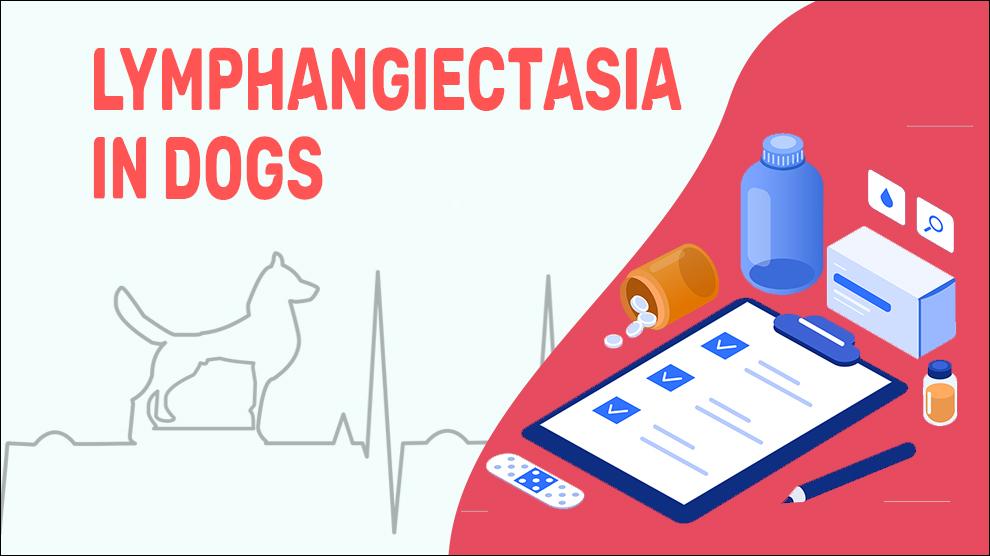What Is Lymphangiectasia In Dogs?
Lymphangiectasia is superficial dilatation of intestinal lacteals caused by leakage of lymphatic fluid due to a wide range of scarring processes. This is a chronic canine protein-losing enteropathy caused by obstruction to the normal lymphaticovenous flow resulting in impaired intestinal lymph drainage.
The obstruction to the normal lymphaticovenous flow is due to an acquired secondary lymph vessel obstruction caused by neoplastic or granulomatous diseases (acquired lymphangiomas) or congenital developmental disorder of the lymphatic vessels.
Acquired lymphangiomas most commonly occur in older dogs as a late consequence of radiation therapy and mastectomy. There is no consistent nomenclature. Many authors use the terms lymphangioma circumscriptum and acquired lymphangioma interchangeably.
In most cases of acquired lymphangiectasia, the cause is unknown (idiopathic). There is a special case called lipogranulomatous lymphangiectasia - the name itself is descriptive of the presence of lesions.
Symptoms Of Lymphangiectasia In Dogs
Treatment Options For Lymphangiectasia In Dogs
The first step is to establish the underlying cause and this will help direct the treatment plan.
Immune Suppressive Medication: Prednisone: dose of 30mg/m2 in larger dogs or 1-2mg/kg/day.
Cyclosporine: 5mg/kg/day.
Anti-Clotting Medications: Aspirin and Clopidogrel.
There is no successful curative therapy followed for lymphangiectasia currently other than nutritional modulation of diet.
Dietary treatment consists of normal caloric intake, low-fat foods with colloid fluid or albumin supplementation.
If there is an intestinal obstruction (such as a tumor), Surgery and chemotherapy may be required.
Home Remedies For Lymphangiectasia In Dogs
- Follow your veterinarian’s guidelines for treatment and give the medications exactly as prescribed.
- Follow-up exams will need to be scheduled to make sure that all of the condition has been eliminated.
- Your veterinarian can prescribe the proper food regimen required to keep your pet as healthy as possible.
Prevention Of Lymphangiectasia In Dogs
The only way to prevent lymphangiectasia is to check with your vet if you notice any peripheral edema or at the first sign of any infection or any uncontrolled Diarrhea and dehydration.
Affected Dog Breeds Of Lymphangiectasia
Basenji, Soft Coated Wheaten Terrier, Shar Pei, Norwegian Lundehund, Rottweiler, Yorkshire Terrier
Additional Facts For Lymphangiectasia In Dogs
Causes:
- Inflammation of the intestine
- Inflammatory bowel disease
- Right-sided congenital heart failure
- Histoplasmosis (a fungal infection)
- Pericarditis
- Budd-Chiari syndrome
- Dilation of the blood vessels
- Intestinal bleeding (intestinal parasites, parvovirus, cancer such as lymphoma)
- Intestinal cancer
- Crypt disease (crypt dilation and abscesses)
- Obstruction of vessels in the thoracic duct
Types:
- Primary (Congenital): Abnormal lymphatic vessel development from birth.
- Acquired: Blockage of the lymphatic outflow or venous hypertension.
Morbidity:
Lymphangiectasia and Inflammatory bowel disease (IBD):
Lymphangiectasia is often diagnosed alongside IBD but it is still doubtful whether they both stem from the same pathogenic process or one precedes the other.
Some authors break down intestinal lymphangiectasia into two categories:
Idiopathic lymphangiectasia vs secondary lymphangiectasia (WRT inflammation).
The origin of the often observed inflammatory process of lymphangiectasia is not yet conclusively determined whether it is primary and contributory, or it may be associated with a separate pathological process.
Generalized gastrointestinal diseases (gastric neoplasia, idiopathic gastritis, etc) may take place together with lymphangiectasia. While the pathogenesis is not clearly understood, the presence of neoplastic or inflammatory infiltrate in the lymph vessels might enlighten their relation.
Diagnosis:
- Histological evaluation
- Necropsy
- Biopsies
- Endoscopic examinations - 42% specificity and 68% sensitivity
- Ultrasound - hyperechoic
- Mucosal striations
Mortality:
The mortality of lymphangiectasia depends on the cause of inflammation. Infections or intestinal inflammations are not usually serious. Neoplastic causes of lymphangiectasia usually have a mortality rate higher.
Prognosis:
Response and prognosis are in direct correlation to the extent of the disease. Lymphangiectasia's long-term prognosis is guarded as it is not curable, but it is usually manageable.
Sadly, some dogs fail to respond to treatment. These are the cases of euthanasia if their quality of life is affected.
Even if the underlying condition is treated successfully, remissions may occur and this is completely dependent on that underlying condition and the severity of the disease.
When To See A Vet For Lymphangiectasia In Dogs?
Contact your vet right away, if you notice any of the following:
- If you notice any peripheral edema.
- Profound weight loss.
- Any uncontrolled Diarrhea and dehydration.
Food Suggestions For Lymphangiectasia In Dogs
Nutritional management of lymphangiectasia:
- High in protein dry matter basis (25-30% digestible protein).
- Fat (15%).
- Fiber - 8%.
- Foe severely affected dogs, follow an "elemental diet"- powders that can be mixed with water.
- Fat-soluble vitamins A, D, E, and K supplementation.
- Vitamin B-12 supplementation.
Conclusion
Currently, a definite diagnosis of lymphangiectasia is challenging because of the biopsies and tests required to reach the diagnosis. Moreover, the diagnosis can be frustrating as there is no cure. Response to treatment is inconsistent and dog-specific.
Once the diagnosis of lymphangiectasia is done, the only way to know if treatment will work for a particular dog is to try treatment and check the response.

















